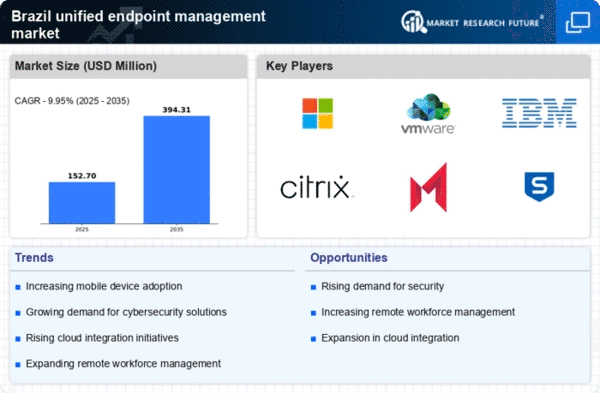Adoption of IoT Devices
The proliferation of Internet of Things (IoT) devices in Brazil is reshaping the landscape of the unified endpoint-management market. With an estimated 1.5 billion connected devices expected by 2025, organizations face challenges in managing and securing these endpoints. Unified endpoint-management solutions are essential for integrating IoT devices into existing IT infrastructures, providing centralized control and monitoring capabilities. This integration is crucial for maintaining operational efficiency and security, as IoT devices often present unique vulnerabilities. The demand for solutions that can effectively manage a diverse array of endpoints, including IoT devices, is likely to drive market growth. As businesses increasingly recognize the importance of comprehensive endpoint management, investments in these technologies are expected to rise significantly.
Increasing Mobile Workforce
The rise of the mobile workforce in Brazil is a pivotal driver for the unified endpoint-management market. As organizations increasingly adopt remote work policies, the need for effective management of diverse devices becomes paramount. In 2025, it is estimated that over 50% of the workforce in Brazil operates remotely, necessitating robust solutions to ensure security and productivity. Unified endpoint-management solutions facilitate seamless access to corporate resources while maintaining stringent security protocols. This trend indicates a growing demand for solutions that can manage various endpoints, including smartphones, tablets, and laptops, from a centralized platform. Consequently, businesses are likely to invest in unified endpoint-management technologies to enhance operational efficiency and safeguard sensitive data, thereby propelling market growth.
Growing Cybersecurity Threats
The escalating cybersecurity threats in Brazil are a critical driver for the unified endpoint-management market. As cyberattacks become more sophisticated, organizations are compelled to adopt advanced security measures to protect their endpoints. In 2025, it is anticipated that cybercrime will cost Brazilian businesses over $10 billion annually, highlighting the urgent need for effective endpoint management solutions. Unified endpoint-management systems provide essential features such as threat detection, incident response, and data encryption, which are vital for safeguarding sensitive information. This growing awareness of cybersecurity risks is likely to propel organizations to invest in unified endpoint-management technologies, thereby fostering market expansion. The emphasis on proactive security measures will continue to shape the landscape of the unified endpoint-management market.
Regulatory Compliance Requirements
Brazil's regulatory landscape is evolving, with increasing emphasis on data protection and privacy laws. The unified endpoint-management market is significantly influenced by these compliance requirements, particularly with the implementation of the General Data Protection Law (LGPD). Organizations are compelled to adopt comprehensive endpoint management solutions to ensure adherence to these regulations. In 2025, it is projected that compliance-related investments will account for approximately 30% of IT budgets in Brazil. This trend underscores the necessity for unified endpoint-management systems that can provide visibility and control over all endpoints, ensuring that organizations meet legal obligations while minimizing risks associated with data breaches. As a result, the market is likely to experience accelerated growth driven by the need for compliance.
Demand for Cost-Effective Solutions
In Brazil, the pursuit of cost-effective IT solutions is a significant driver for the unified endpoint-management market. Organizations are increasingly seeking ways to optimize their IT expenditures while maintaining high levels of productivity and security. Unified endpoint-management solutions offer a consolidated approach to managing multiple devices, which can lead to reduced operational costs. In 2025, it is projected that companies will save up to 25% on IT management costs by implementing these solutions. This financial incentive encourages businesses to adopt unified endpoint-management technologies, as they streamline processes and reduce the need for multiple disparate systems. As organizations strive for efficiency and cost savings, the demand for unified endpoint-management solutions is expected to grow, further enhancing market dynamics.
















